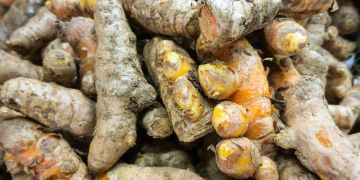Health benefits
Anti-inflammatory properties
The active ingredient in turmeric, curcumin, has anti-inflammatory and disinfecting properties. This explains its healing powers when applied to cuts and abrasions. Taken orally as an anti-inflammatory, turmeric does not have the side-effects commonly associated with some modern pharmaceutical medicines. These include intestinal bleeding, ulcers, and the decrease of white blood cells. This makes turmeric a safe alternative to some non-prescription drugs. As a natural anti-inflammatory, turmeric aids in giving relief to sufferers of arthritis, osteoarthritis, and rheumatoid arthritis. It may also slow the progression of multiple sclerosis.
Aids digestion
Turmeric's detoxification qualities promote healthy digestion and may aid in weight management. Studies have shown that it helps clear LDL (bad cholesterol) from the liver and enhances liver function. Because of its detoxification and anti-inflammatory qualities, turmeric is used as a dietary supplement for relief from irritable bowel syndrome and stomach disorders. Benefits of turmeric consumption include the reduction of gas and bloating.
Cardiovascular disease and diabetes
Turmeric also reduces the buildup of plaque associated with cardiovascular disease. Curcumin in turmeric lowers two inflammatory enzymes, LOX and COX-2. This helps stop platelets from gathering to form blood clots. Turmeric reduces blood sugar levels, a property valuable for helping those suffering from diabetes.
Aids cancer treatment and prevention
Using turmeric may have effects on slowing or preventing many forms of cancer. It slows the spread of cancer cells through elimination. Studies have produced evidence that turmeric can aid in preventing breast cancer from spreading to the lungs. It may help prevent colon cancer, and a study published in 2008 shows that it may aid in the prevention of pancreatic cancer.
Other foods combined with turmeric boost its healing capabilities. When combined with cauliflower, turmeric may help prevent prostate cancer. Onions may enhance the effects of turmeric on preventing colon cancer. Turmeric also helps prevent melanoma and stops the growth of new blood vessels developing in tumors. It is also thought to reduce the risk of childhood leukemia.
Alzheimer's
Turmeric prevents and slows the progression of Alzheimer disease by removing amyloid plaque from the brain. It keeps amyloid A fibroid from gathering to form plaque that leads to complication of the brain.
Traditional use
Although most often used for culinary purposes such as curries for Asian dishes, and for human consumption as a dietary supplement, turmeric has other uses as well. Indians have used turmeric for its rich, orange color to make dye for clothing and textiles. It is also used as a coloring for mustard, butter and cheese. Gardeners and homeowners have found that the herb tends to deter ants.
Turmeric can be consumed in its original powdered form through culinary additions to other foods. For more concentrated doses, dietary supplements in the form of capsules can be taken. Some of these supplements are combined with other ingredients to enhance its effectiveness on delivering health benefits to the body.





